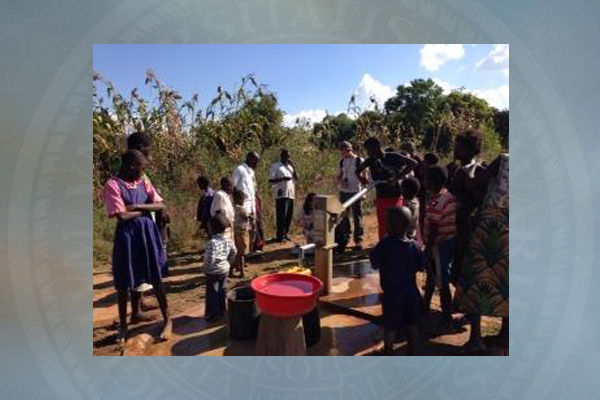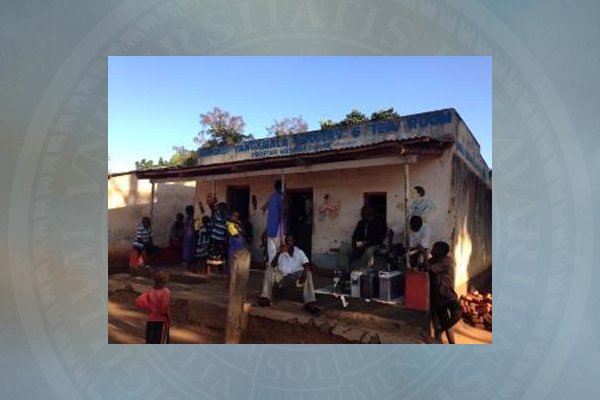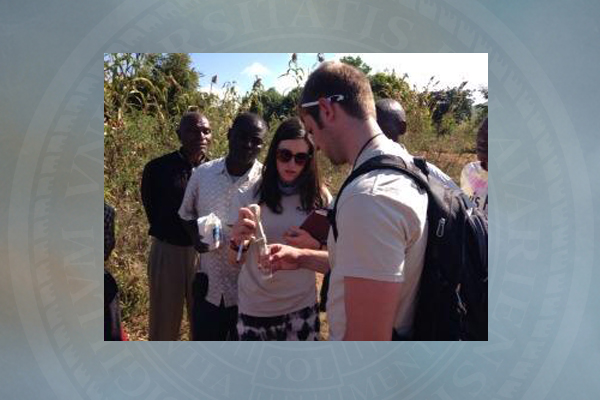


Freshly engineered water
Engineering students help struggling Malawian communities access potable water
11:08 a.m., June 12, 2014--In the Sakata region of Malawi, Africa, women and girls from five villages walk three and a half hours one way to reach a lake. Once they arrive, they gather the water in buckets, and journey back to their homes in the hopes that the precious resource will sustain their communities for another day.
When those involved in the University of Delaware student chapter of Engineers Without Borders (EWB-UD) heard about this problem that impacts residents in the rural villages of Chilimani, Liti, Nkagula, Kanyenda and Phero, they decided to get involved.
Global Stories
Fulbright awards
Peace Corps plans
Now, a team of three EWB-UD engineering students is traveling to those areas in Malawi this month to conduct preliminary research for a potable water project. While there, the chapter is signing a five-year commitment with the communities that requested help.
Engineers Without Borders is a national non-profit organization of dedicated students and professionals who believe everyone should have access to adequate sanitation, safe drinking water and other resources to meet their basic needs.
Once it has identified a problem, the organization works with an international organization and professionals to develop and implement a sustainable solution.
According to Samantha Meehan, junior chemical engineering major and Malawi project manager, what makes this project important is that nearly half of the village population consists of children under the age of 15, and the majority of residents endure water-borne illness and other health-related consequences such as high infant mortality rates.
The project goal is to reduce the prevalence of water-borne illness, increase productivity and school attendance so the villagers can have a better quality of life.
“Water is a basic need that we take for granted in this country. So the fact that another country is asking us to help provide them with potable water that is easily accessible really makes their needs stand out,” Meehan said.
While there, Meehan and her teammates are building relationships with community members and leaders, conducting health and wellness surveys, interviewing residents about their needs, identifying available resources and taking baseline data for water quality, among other tasks.
Building mutual trust and establishing intentions between EWB-UD and the community and government officials is an important aspect of the trip since both parties are working together to implement a resolution, Meehan said.
“Developing connections are important to ensure they know we care and we are here for the right reasons,” she said. “Plus, when you show people that what you are doing is helping them, they are more likely to be mutually invested in it.”
Gretchen Bauer, professor of political science and international relations, is also accompanying the engineering students as a professional mentor. Her expertise in sub-Saharan African politics helps them understand and navigate the political and social context in which they are working.
“Around the world, perhaps especially in sub-Saharan Africa, politics and governance are fundamental to development,” Bauer said. “So it is important that, just like in research and teaching, we take an interdisciplinary approach.”
Another key component to the long-term success of the project, Meehan said, is the education she and her teammates have received. Not only are they able to apply their knowledge to a real-world problem, but teach others in Malawi as well.
“When you educate everyone on how something works, the problem is less likely to happen again in the future,” Meehan said. “Providing that knowledge gives them the opportunity to expand on the project or make it their own after our partnership is over.”
Other engineering students currently in Malawi include Dakota Hanemann-Rawlings and Alex Lauderback. UD engineering alumna Samantha Battle also joins the team as a professional mentor.
To follow the progress of the Malawi project, visit the EWB-UD Facebook page.
Article by Collette L. O’Neal
Photos courtesy of Engineers Without Borders-UD










